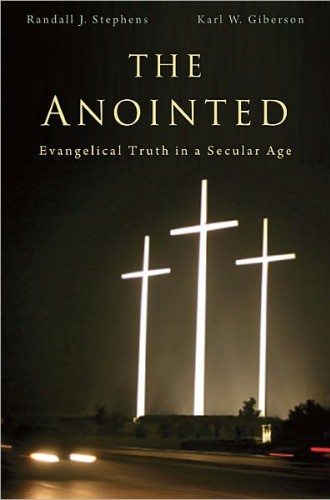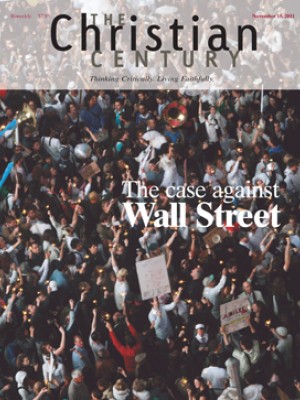The Anointed, by Randall J. Stephens and Karl W. Giberson
In high school I was taught that the Earth is about 10,000 years old. But I also learned the basics of evolution from my evangelical teachers. School administrators knew that students taking Advanced Placement biology exams and heading off to state universities needed to understand secular scientific reasoning, if only to combat it properly.
Then, during my freshman year of college, I met Ken Ham. The popular creationist came to my town to hold a series of seminars on creationism. I went, eager to see the celebrity Christian apologist. What I saw and heard disturbed me. I had learned enough science to know that the issues he raised were complicated. But Ham made them seem simple. Too simple.
Read our latest issue or browse back issues.
After his presentation, I waited patiently to talk to him. He may have been tired or he may have been having a bad day, but when I got to the front of the line, he flippantly dismissed what was a real question from a real seeker.
If this is creationism, I wondered, do I want to be a part of it? Eventually I realized that I did not. Then I slowly began to learn something that few evangelicals know. The majority of science professors at the nation's leading evangelical colleges have little problem reconciling evolution with Genesis. Creationism is far more popular in the pews than in the academy—even the evangelical academy.
In The Anointed, historian Randall Stephens and physicist Karl Giberson, both professors at Eastern Nazarene College, seek to explain how the academic-lay divide has grown so wide. This engaging and smart study focuses on a small group of extremely popular evangelical leaders (the "anointed") who have shaped the beliefs of millions of American Christians. They are men who successfully challenge secular knowledge and authority, and they also challenge a substantial group of more educated, more scholarly evangelicals.
Stephens and Giberson begin by dissecting the work of two sets of experts who prove to be easy targets: creationists, represented by Ken Ham, and amateur historians, represented by David Barton. Neither Ham nor Barton has any advanced credentials in the fields in which each claims expertise, and neither has ever published any scholarly, peer-reviewed work. Barton's history is as bad as Ham's science. And yet both sell thousands and thousands of books and oversee substantial Christian media empires.
Then Stephens and Giberson turn to two other types of Christian authorities—psychologists, represented by James Dobson, and apocalyptic theologians, such as Tim LaHaye. Unlike Ham and Barton, Dobson does have significant academic credentials. He earned a doctorate in child development from the University of Southern California and served on the faculty at USC's department of pediatrics in the School of Medicine and also on the faculty at Children's Hospital Los Angeles. In the 1960s he published important work in respected journals. However, that does not make him inerrant.
Stephens and Giberson critique Dobson's defense of corporal punishment (Dobson believes that spanking children is sometimes appropriate) and his refusal to accept recent research on the nature of homosexuality. But the real problem with Dobson is not his psychology. It is the way in which he grounds his culture-war politics in supposed psychological truths about gender, the family and sexual orientation, claiming knowledge that extends well beyond current research in the field.
Tim LaHaye, the most successful of the anointed, at least in terms of book sales, is not particularly well educated. His theology is not as superficial as the authors make it appear. Many important evangelical theologians across the 20th century, some of whom boast doctoral degrees from top-tier universities, have shared LaHaye's apocalyptic expectations. However, as with Dobson, LaHaye's use of abstract theology to bolster his brand of right-wing politics is problematic for Stephens and Giberson.
The Anointed debunks the ways in which evangelical celebrity leaders claim scholarly authority in their promotion of right-wing political causes. But its argument is about much more than that. The authors carefully analyze the great chasm between evangelical popular beliefs, as represented by Ham, Barton, Dobson and LaHaye, and the ideas of academically respected evangelical scholars. The authors rightly suggest that scientists like Francis Collins, director of the National Institutes of Health; historians like Mark Noll, who holds an endowed chair at Notre Dame; and theologians like N. T. Wright—all of them evangelicals—should serve as important authorities for the faithful. Instead, the vast majority of evangelicals turn to the anointed leaders, who generally position themselves as crusaders against a supposedly hostile culture.
How do the anointed pull this off? According to the authors, they build constituencies by "finding themes around which to rally their followers, playing on common fears, identifying out-groups to demonize, and projecting confidence." Most professional academics do nothing of the sort and therefore do not build such powerful followings. Christian scholars are far more likely to be found doing research in dingy archives or chatting with students in coffee shops than discussing the founding fathers with Glenn Beck or holding revival rallies that mix evangelicalism, patriotism and creationism. They are not expert fund-raisers, and they do not buy media time.
The authors further attribute much of the success of the anointed to Americans' democratic impulses. "The practical knowledge of ordinary people," they write, has often "trumped purely intellectual pursuits. . . . Someone just like us is more likely to tell us the truth, we intuit, than is a famous egghead from a far-off university with whom we have nothing in common." When laypeople have to make a choice between competing claims regarding the faith of the nation's founders, the age of the Earth, the biblical view of marriage and an assortment of other issues, it makes sense that they would turn to those who claim biblical authority, whose work is explicitly called ministry and who have a public Christian testimony. Why trust "an unknown but well-credentialed scientist who works at a famous but very liberal university that used to be a Christian institution" when they can trust a guy who speaks from a pulpit with his pastor's endorsement?
The Anointed is one of the best and most important books on religion published this year. It is a well-written, well-argued study that penetrates to the heart of modern evangelical culture. Stephens and Giberson have done an excellent job of critiquing what Mark Noll has called the "scandal of the evangelical mind" (the scandal, wrote Noll, is "that there is not much of an evangelical mind") while empathetically explaining why so many evangelicals are smitten with dubious experts. Evangelicals who take the intellect seriously, as well as outsiders struggling to understand the evangelical subculture, will benefit from their hard work and keen insights.







